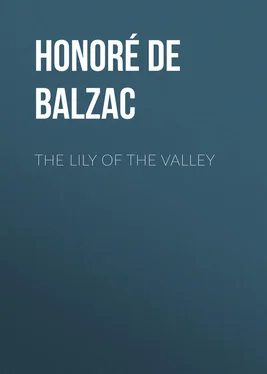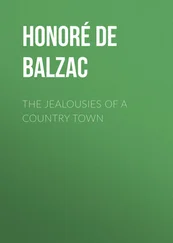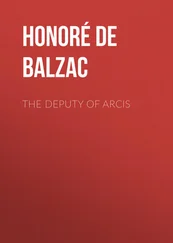Honoré Balzac - The Lily of the Valley
Здесь есть возможность читать онлайн «Honoré Balzac - The Lily of the Valley» — ознакомительный отрывок электронной книги совершенно бесплатно, а после прочтения отрывка купить полную версию. В некоторых случаях можно слушать аудио, скачать через торрент в формате fb2 и присутствует краткое содержание. Жанр: literature_19, foreign_antique, foreign_prose, на английском языке. Описание произведения, (предисловие) а так же отзывы посетителей доступны на портале библиотеки ЛибКат.
- Название:The Lily of the Valley
- Автор:
- Жанр:
- Год:неизвестен
- ISBN:нет данных
- Рейтинг книги:4 / 5. Голосов: 1
-
Избранное:Добавить в избранное
- Отзывы:
-
Ваша оценка:
- 80
- 1
- 2
- 3
- 4
- 5
The Lily of the Valley: краткое содержание, описание и аннотация
Предлагаем к чтению аннотацию, описание, краткое содержание или предисловие (зависит от того, что написал сам автор книги «The Lily of the Valley»). Если вы не нашли необходимую информацию о книге — напишите в комментариях, мы постараемся отыскать её.
The Lily of the Valley — читать онлайн ознакомительный отрывок
Ниже представлен текст книги, разбитый по страницам. Система сохранения места последней прочитанной страницы, позволяет с удобством читать онлайн бесплатно книгу «The Lily of the Valley», без необходимости каждый раз заново искать на чём Вы остановились. Поставьте закладку, и сможете в любой момент перейти на страницу, на которой закончили чтение.
Интервал:
Закладка:
Her arms were beautiful. The curved fingers of the hand were long, and the flesh projected at the side beyond the finger-nails, like those of antique statues. I should displease you, I know, if you were not yourself an exception to my rule, when I say that flat waists should have the preference over round ones. The round waist is a sign of strength; but women thus formed are imperious, self-willed, and more voluptuous than tender. On the other hand, women with flat waists are devoted in soul, delicately perceptive, inclined to sadness, more truly woman than the other class. The flat waist is supple and yielding; the round waist is inflexible and jealous.
You now know how she was made. She had the foot of a well-bred woman, – the foot that walks little, is quickly tired, and delights the eye when it peeps beneath the dress. Though she was the mother of two children, I have never met any woman so truly a young girl as she. Her whole air was one of simplicity, joined to a certain bashful dreaminess which attracted others, just as a painter arrests our steps before a figure into which his genius has conveyed a world of sentiment. If you recall the pure, wild fragrance of the heath we gathered on our return from the Villa Diodati, the flower whose tints of black and rose you praised so warmly, you can fancy how this woman could be elegant though remote from the social world, natural in expression, fastidious in all things which became part of herself, – in short, like the heath of mingled colors. Her body had the freshness we admire in the unfolding leaf; her spirit the clear conciseness of the aboriginal mind; she was a child by feeling, grave through suffering, the mistress of a household, yet a maiden too. Therefore she charmed artlessly and unconsciously, by her way of sitting down or rising, of throwing in a word or keeping silence. Though habitually collected, watchful as the sentinel on whom the safety of others depends and who looks for danger, there were moments when smiles would wreathe her lips and betray the happy nature buried beneath the saddened bearing that was the outcome of her life. Her gift of attraction was mysterious. Instead of inspiring the gallant attentions which other women seek, she made men dream, letting them see her virginal nature of pure flame, her celestial visions, as we see the azure heavens through rifts in the clouds. This involuntary revelation of her being made others thoughtful. The rarity of her gestures, above all, the rarity of her glances – for, excepting her children, she seldom looked at any one – gave a strange solemnity to all she said and did when her words or actions seemed to her to compromise her dignity.
On this particular morning Madame de Mortsauf wore a rose-colored gown patterned in tiny stripes, a collar with a wide hem, a black belt, and little boots of the same hue. Her hair was simply twisted round her head, and held in place by a tortoise-shell comb. Such, my dear Natalie, is the imperfect sketch I promised you. But the constant emanation of her soul upon her family, that nurturing essence shed in floods around her as the sun emits its light, her inward nature, her cheerfulness on days serene, her resignation on stormy ones, – all those variations of expression by which character is displayed depend, like the effects in the sky, on unexpected and fugitive circumstances, which have no connection with each other except the background against which they rest, though all are necessarily mingled with the events of this history, – truly a household epic, as great to the eyes of a wise man as a tragedy to the eyes of the crowd, an epic in which you will feel an interest, not only for the part I took in it, but for the likeness that it bears to the destinies of so vast a number of women.
Everything at Clochegourde bore signs of a truly English cleanliness. The room in which the countess received us was panelled throughout and painted in two shades of gray. The mantelpiece was ornamented with a clock inserted in a block of mahogany and surmounted with a tazza, and two large vases of white porcelain with gold lines, which held bunches of Cape heather. A lamp was on a pier-table, and a backgammon board on legs before the fireplace. Two wide bands of cotton held back the white cambric curtains, which had no fringe. The furniture was covered with gray cotton bound with a green braid, and the tapestry on the countess’s frame told why the upholstery was thus covered. Such simplicity rose to grandeur. No apartment, among all that I have seen since, has given me such fertile, such teeming impressions as those that filled my mind in that salon of Clochegourde, calm and composed as the life of its mistress, where the conventual regularity of her occupations made itself felt. The greater part of my ideas in science or politics, even the boldest of them, were born in that room, as perfumes emanate from flowers; there grew the mysterious plant that cast upon my soul its fructifying pollen; there glowed the solar warmth which developed my good and shrivelled my evil qualities. Through the windows the eye took in the valley from the heights of Pont-de-Ruan to the chateau d’Azay, following the windings of the further shore, picturesquely varied by the towers of Frapesle, the church, the village, and the old manor-house of Sache, whose venerable pile looked down upon the meadows.
In harmony with this reposeful life, and without other excitements to emotion than those arising in the family, this scene conveyed to the soul its own serenity. If I had met her there for the first time, between the count and her two children, instead of seeing her resplendent in a ball dress, I should not have ravished that delirious kiss, which now filled me with remorse and with the fear of having lost the future of my love. No; in the gloom of my unhappy life I should have bent my knee and kissed the hem of her garment, wetting it with tears, and then I might have flung myself into the Indre. But having breathed the jasmine perfume of her skin and drunk the milk of that cup of love, my soul had acquired the knowledge and the hope of human joys; I would live and await the coming of happiness as the savage awaits his hour of vengeance; I longed to climb those trees, to creep among the vines, to float in the river; I wanted the companionship of night and its silence, I needed lassitude of body, I craved the heat of the sun to make the eating of the delicious apple into which I had bitten perfect. Had she asked of me the singing flower, the riches buried by the comrades of Morgan the destroyer, I would have sought them, to obtain those other riches and that mute flower for which I longed.
When my dream, the dream into which this first contemplation of my idol plunged me, came to an end and I heard her speaking of Monsieur de Mortsauf, the thought came that a woman must belong to her husband, and a raging curiosity possessed me to see the owner of this treasure. Two emotions filled my mind, hatred and fear, – hatred which allowed of no obstacles and measured all without shrinking, and a vague, but real fear of the struggle, of its issue, and above all of her .
“Here is Monsieur de Mortsauf,” she said.
I sprang to my feet like a startled horse. Though the movement was seen by Monsieur de Chessel and the countess, neither made any observation, for a diversion was effected at this moment by the entrance of a little girl, whom I took to be about six years old, who came in exclaiming, “Here’s papa!”
“Madeleine?” said her mother, gently.
The child at once held out her hand to Monsieur de Chessel, and looked attentively at me after making a little bow with an air of astonishment.
“Are you more satisfied about her health?” asked Monsieur de Chessel.
“She is better,” replied the countess, caressing the little head which was already nestling in her lap.
Читать дальшеИнтервал:
Закладка:
Похожие книги на «The Lily of the Valley»
Представляем Вашему вниманию похожие книги на «The Lily of the Valley» списком для выбора. Мы отобрали схожую по названию и смыслу литературу в надежде предоставить читателям больше вариантов отыскать новые, интересные, ещё непрочитанные произведения.
Обсуждение, отзывы о книге «The Lily of the Valley» и просто собственные мнения читателей. Оставьте ваши комментарии, напишите, что Вы думаете о произведении, его смысле или главных героях. Укажите что конкретно понравилось, а что нет, и почему Вы так считаете.












